
Related
Topics
Guests
- Peter Lancefive-time Emmy Award-winning investigative reporter and a former ABC News correspondent. His latest book is Triple Cross. His previous books include 1000 Years for Revenge and Cover Up.
Links
New details have emerged about how an al-Qaeda spy named Ali Mohamed penetrated the CIA, the Green Berets and the FBI before the 9/11 attacks. We speak with investigative journalist Peter Lance about his new book, “Triple Cross.” [includes rush transcript]
Transcript
AMY GOODMAN: We turn now to, well, new details emerging about how an al-Qaeda spy named Ali Mohamed penetrated the CIA, the Green Berets and the FBI before the 9/11 attacks. Ali Mohamed was a member of Osama bin Laden’s inner circle who operated freely within the United States for years before 9/11. Despite being a top al-Qaeda operative, he managed to become a naturalized U.S. citizen, join the U.S. Army, get posted to the military base where Green Berets and Delta Force train, and infiltrate both the CIA and FBI. And while he was an FBI informant, he smuggled bin Laden in and out of Afghanistan and helped plan the attacks on U.S. embassies in Africa. He ended up playing a pivotal role in 9/11.
This all according to journalist Peter Lance, who joins us here in New York, a five-time Emmy Award-winning investigative reporter, former ABC News correspondent. His new book is quite a tome. It’s called Triple Cross: How bin Laden’s Master Spy Penetrated the CIA, the Green Berets, and the FBI—and Why Patrick Fitzgerald Failed to Stop Him. Welcome to Democracy Now!
PETER LANCE: Good to be back, Amy.
AMY GOODMAN: Well, lay out this story.
PETER LANCE: OK. Well, Ali Mohamed was—the story actually begins 20 years before 9/11 with the murder of Anwar Sadat. Ali Mohamed was actually a member of the radical Egyptian army unit that murdered Sadat. Only, at the time, he escaped investigation because he happened to be at Fort Bragg even then on an officer exchange program. And when Mubarak took over in Egypt, he purged the military of some radical elements, and Ali was discharged.
But Dr. Imam al-Zawahiri, who was then emerging as the leader of the Egyptian Islamic Jihad, recognized Ali Mohamed’s potential. Amy, he was an army commando. He spoke four languages, including Hebrew. He had two degrees in psychology. So Dr. al-Zawahiri pretty much adopted him and sponsored him and first vectored him toward Egypt Air. He spent a year at Egypt Air, the state airline, where he studied all the air piracy counterterrorism measures.
He then—you know, there was the Marine barracks bombing in Lebanon in ’83, October. And the previous April, there was the embassy bombing, the kidnapping of the CIA station chief. So the CIA was desperate at that point in early ’84 to get anyone who, you know, could speak Arabic or had any sense of the Islamic world. So Ali walked into the CIA station in Cairo and presented himself, and they vetted him to some degree, but they sent him to Hamburg, where the primary CIA station looking into Hezbollah was operated. And he went to work briefly as a CIA operative in Hamburg and infiltrated a mosque, only, according to legend, blown his cover.
But, Amy, mysteriously he was able to get past the U.S. watch list. And one of his former CO at Fort Bragg told me he believed that he had had help from the CIA getting into America. On the plane on the way in, a TWA flight, he met a woman from California who was coming back from Greece on vacation, about 10 years older than him. And six weeks later, they were married at a drive-through wedding chapel in Reno, Nevada. He is now living in Santa Clara in her condo in the middle of, you know, the high-tech heartland, and eventually enlists in the U.S. Army, as you said, goes in as an enlisted man, because I believe that, you know, OCS, Officer Candidate School, would have subjected him to greater scrutiny.
But in any event, he ends up at the John F. Kennedy Special Warfare School at Fort Bragg, which is the heart of the advanced training for Delta Force and the Greet Berets. And his CO, Colonel Anderson, told us, he said it would be easier to win the power ball lottery than to be in the unit that murdered Anwar Sadat and get past the watch list and end up at the SWC, they call it.
AMY GOODMAN: How do you know all this?
PETER LANCE: Well, I know it because, you know, I have been working for five years now, Amy, focusing primarily on the two bin Laden offices of origin, the New York office of the FBI and the Southern District Prosecutor’s Office. Up until 9/11, the war on terror, as you know, was fought as a series of legal cases, a stone’s throw from where we are here in the Southern District.
And so, what I did when I went—right after 9/11, when I began, really “How did this happen?” and “Could it happen again?” were my two questions. So, what I did was, I read all 40,000 pages of the Southern District cases. I read every book on the subject, 10,000 articles. You know, Paul Thompson has—I’ve worked closely with Paul Thompson of cooperativeresearch.org and basically, you know, began developing sources inside and outside of the bureau.
And one day, I woke up—after the first book, I showed tremendous negligence by the bureau, and then gross negligence, in my second book, to the point of suppression of some evidence. And I still couldn’t connect the dots. And one day, I woke up, and I went, “Ali Mohamed is the key.” I mentioned him briefly in my first two books. And there had been about a dozen articles on him, which I cite in the beginning of the book. New York Times had done pieces on him. But no one had ever looked at him in depth.
And when I began to, you know, peel back the layers on Ali Mohamed’s career, I realized that the principal fed, the principal prosecutor who was running Squad I-49 effectively in the New York office of the bureau, the bin Laden squad, was Patrick Fitzgerald. Patrick Fitzgerald, from January 1996, was charged by the Justice Department with pretty much getting bin Laden. President Clinton had issued—
AMY GOODMAN: Explain his position at the time.
PETER LANCE: At the time, he was a prosecutor in the Southern District. He was soon to become, ironically, head of Organized Crime and Terrorism in the Southern District. And this is the office, by the way, that produced Rudy Giuliani, Louis Freeh. It’s the primary—it’s the stellar U.S. Federal Prosecutor’s Office.
AMY GOODMAN: And, of course, Patrick Fitzgerald is the man who eventually went on to investigate the Valerie Plame case.
PETER LANCE: Absolutely, and became U.S. attorney in Chicago. In fact, he made—I would speak metaphorically and say he made his bones, he became famous, on the African embassy bombing case, which was called U.S. v. Bin Laden in February of ’01. But he ended up convicting one primary player, Wadi al-Hajj, but the other people convicted were fairly minor players.
Ali Mohamed, Amy, on the other hand, was the principal—not only did he do the surveillance for the bombing in 1993, but bin Laden himself, according to Ali’s testimony, pointed to the pictures and said, “This is where I want the suicide truck bomb to go.” Five years later, that’s exactly where the bomb in Nairobi went off. Ali sustained the cell. He interacted regularly with Wadi al-Hajj, and yet he’s also an FBI informant on the West Coast from 1992. Amy, this man trained the original World Trade Center bombing cell. He trained the—
AMY GOODMAN: You mean in 1993.
PETER LANCE: In 1993. The cell that worked with Ramzi Yousef to do the first World Trade Center bombing. He trained El Sayyid Nosair, the Egyptian who murdered Rabbi Meir Kahane in 1990. In fact, he stayed at his house. He used to come up weekends from Fort Bragg, and he would bring top-secret—I have like 30 pages of heretofore classified documents in the book. And he would bring these top-secret memos from Fort Bragg, and he’d give them to Nosair. They found them the night after the rabbi’s murder in Nosair’s apartment. And they also found two operatives, Abu Halima and Salameh, that night. They arrested them. And these men were photographed, along with Nosair, in Calverton, Long Island, in 1989. Now, this was when Bush 41 is in the White House.
The New York office of the FBI, their elite unit that got John Gotti, over four weekends in July of '89, they followed a group of men—MEs, they called them, for Middle Eastern men—and they followed them, Amy, from the Al Farooq Mosque on Atlantic Avenue in Brooklyn out to the shooting range, where they're firing automatic weapons in the middle of the summer. And of the men photographed by the FBI when Bush 41 was in the White House, three were later convicted in the Trade Center bombing. One, Nosair, was convicted both initially for the gun charges and the rabbi’s death, and eventually Patrick Fitzgerald and Andrew McCarthy convicted him in what was called the “Day of Terror” plot, the bridge-and-tunnel plot.
So the FBI had Ali Mohamed’s cell on the radar in '89. They had Ali himself working as an informant from 1992. And he is literally, as you pointed out—he moved the entire al-Qaeda leadership from Afghanistan to Sudan. He set up the al-Qaeda training camps. He trained bin Laden's personal body guard, lived in bin Laden’s house and, as I said, was the primary player behind the African embassy bombings.
I prove in this book—and I challenge Patrick Fitzgerald who refused to talk to me, but I challenge him to show me where they could not have prevented the African embassy bombings. Squad I-49, this elite squad of FBI units, which he was effectively directing, had a wiretap on the home in Kenya of Wadi al-Hajj. They searched Wadi al-Hajj’s house, Amy, in August of '97 in Kenya. They found Ali Mohamed's phone number and contact information in Sacramento.
Patrick Fitzgerald himself had a meeting with Ali Mohamed, face to face, in Sacramento in October, at which point Ali said to him—and by the way, at this point Ali Mohamed is a naturalized U.S. citizen, an Army veteran getting a pension, you know, from the U.S. Army—he said to Patrick Fitzgerald across the table, “I love bin Laden. I do not need a fatwa to attack America. I have a number of sleepers who I can make operational like that. And I could just”—
AMY GOODMAN: And this, you have from what, this information?
PETER LANCE: From Jack Cloonan, the principal agent who was at the meeting. He was the principal agent—one of the two or three principal agents in Squad I-49, was at the meeting. So it’s, you know, from the mouth of the agent who was there. And after the meeting, Patrick Fitzgerald turned to Cloonan and said, “That is the most dangerous man I have ever met. We cannot leave him on the street.” And yet, they did, Amy, for ten more months, only to have the bombs go off. They waited a month to arrest him. And even when they arrested him, they kept him on a John Doe warrant for nine months in the Southern District, because they didn’t want the media to know effectively they had been snookered by this guy.
AMY GOODMAN: A John Doe warrant means they didn’t name him.
PETER LANCE: Didn’t name him. And they negotiated with him for almost two years to cut a deal. But Ali had all the cards, if you will, in the poker game. Why? Because he knew that the feds would never want the record that is now contained in this book to come out, how they had been bamboozled and snookered for many years by this principal spy.
AMY GOODMAN: I’m looking at some criticism by Larry Johnson, the former CIA analyst, who says, “Here’s the truth—there is not one document, piece of court evidence, or retired FBI agent that supports the claim that in the year prior to the bombing of the US Embassies in East Africa Ali Mohamed was recorded stating his intent to attack those embassies. Not one.”
PETER LANCE: Larry Johnson is a joke, OK? Larry Johnson was a former CIA officer who happened to be in the same class as Valerie Plame. If you google “Larry C. Johnson” and google “the declining terrorist threat,” he wrote an op-ed page piece on July 10th of 2001, the day the Phoenix memo was issued, that basically said the declining terrorist threat—he was quoted in The New York Times as saying bin Laden is highly overestimated, he’s being treated like a Fortune 500 leader, when in fact al-Qaeda is fragmented.
Larry Johnson has had an animus against me personally for years. Amy, last week, on his website he actually said that I had not won five Emmy Awards. He came right out and said it, and I called the National Academy. They furnished him with proof. It was all on my website. My five Emmys were listed. And he literally maliciously, without even talking to me to confirm, withdrew that, you know, false malicious statement. Larry Johnson’s upset because I’ve named him in my book as an example of how the feds failed on the road to 9/11. He’s a regular talking head, because he has supported, you know—and by the way, I support the investigation—
AMY GOODMAN: And what about the point that there is not one document, not one former FBI agent who supports this idea that he said that he was going to take out the embassies before they were bombed?
PETER LANCE: He never said—I never ever said in my book that he did. I never, ever said in my book that Ali Mohamed said he was going to take out the embassies before they were bombed. What was true, what Jack Cloonan told me, was that Harlan Bell, one of the agents in Squad I-49, after the embassy bombing, he went back and he looked at—he had recorded some conversations with Ali, and Ali said, “We have an operation going on in Africa.” He never mentioned the bombings. I never even said that in the book. What Larry Johnson is trying to do is, because he’s upset that I’ve impeached his credibility, he’s trying to attack my book. And by the way, he made that statement before the book had even come out. He hadn’t even read the book.
AMY GOODMAN: Where is Ali Mohamed today?
PETER LANCE: Ali Mohamed is in some kind of custodial witness protection. As I said, he cut a deal. He escaped the death penalty. He is—I believe he’s in the New York area somewhere, because Cloonan said his wife Linda Sanchez remains loyal to him, visits him regularly, and Cloonan lives in the New York area, and he says, “I see Linda when she comes in to visit Ali.” But they may have moved him by now.
AMY GOODMAN: Why would the U.S. be protecting him?
PETER LANCE: Because he is a one-man 9/11 Commission. Ali Mohamed, if he ever told the full truth under oath, would expose all the years of negligence by the Southern District. Amy, look, Patrick Fitzgerald and the Southern District prosecutors have had an almost unblemished reputation for years as being the primary, you know, terror-busters. You know, Vanity Fair did this glowing article on him, in which they described him as the bin Laden brain, scary smart intelligence.
No one has ever, ever gone back and audited Patrick Fitzgerald in the Southern District. The 9/11 Commission didn’t, because Dietrich Snell was a co-prosecutor with Fitzgerald, is the one who wrote Staff Statement 16 on the origin of the plot. And he literally pushed the plot, the 9/11 plot forward from Manila, the Philippines, with Yousef and Khalid Shaikh. He moved it to 1996, claiming that Khalid Shaikh wasn’t even a member of al-Qaeda at the time.
AMY GOODMAN: What do you think needs to happen now?
PETER LANCE: What I think needs to happen is there needs to be a real investigation of 9/11, not staffed by alumni of the very agencies that, you know, were asleep at the switch in the years leading up to 9/11. It should be staffed by American citizens, journalists, scholars, widows, the Jersey girls should be on it. It should be fully funded, and it should have subpoena power, because anyone that thinks that in reading the 9/11 Commission Report you’ve gotten the full story is wrong. No accountability. They never named a single name in the 9/11 Commission Report.
Ali Mohamed’s entire career is mentioned in one tiny little paragraph of the 9/11 report. Jamie Gorelick was deputy attorney general. She literally—they had Mohammed Jamal Khalifa, bin Laden’s brother-in-law, was captured in December of 1994 with a Newton PDA, a treasure trove of evidence linking him to the Blind Sheikh in New York and Yousef’s cell in Manila. And Jamie Gorelick effectively pushed him out of country to Jordan, even though her own State Department, the State Department said he’s a terrorist, we should investigate him. Not a word of that is in the 9/11 report.
Nor in The Looming Tower. I mean, Lawrence Wright, in this book—and he’s an excellent writer for The New Yorker—Lawrence Wright mentions Mohammed Jamal Khalifa 20 times and never even mentions the fact that he was captured by the bureau, because he interviewed many of these agents and just took their word at face value. What I’ve done is I’ve gone back and I’ve audited them. So anyone who’s read this book—and I recommend that everyone read The Looming Tower, by the way, it’s an excellent book—but that’s half of the story. We need to audit the Justice Department. We need to go back. And this transcends administrations. Fitzgerald is still working for Bush 43. Valerie Caproni, who was party to a cover-up of evidence in 1996 in the Eastern District and with Ramzi Yousef, she is the general counsel to the FBI. So many of these same people are working under Bush 43.
AMY GOODMAN: We’re going to have to leave it there. A very complex story. Peter Lance’s latest book is called Triple Cross: How bin Laden’s Master Spy Penetrated the CIA, the Green Berets, and the FBI—and Why Patrick Fitzgerald Failed to Stop Him. His earlier book, 1000 Years for Revenge, also wrote Cover Up. Thank you, Peter, for being with us.

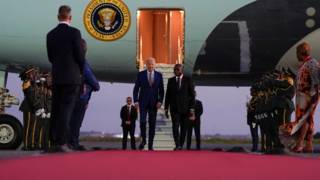

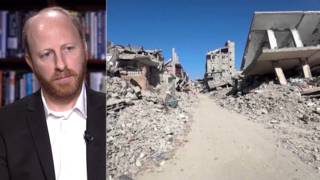
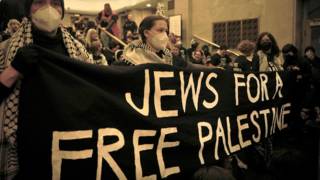





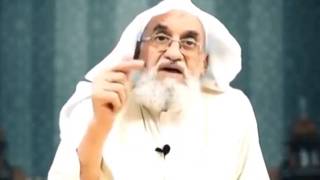
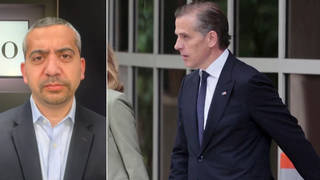
Media Options